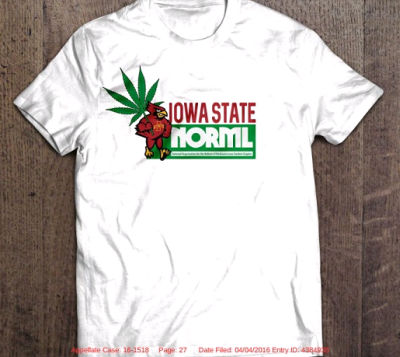Next week (12/14/2016), in a marble tiled courtroom in frosty St. Paul, Minnesota, a panel of judges of the Eighth Circuit Court of Appeals will wrestle with a question that is both as new as the campaign to legalize marijuana and as old as the First Amendment: When can a public university protect its brand, and its valuable trademarks, from being associated with viewpoints or messages that it rejects?
In the case of Gerlich v. Leath (8th Cir., No. 16-1518), a pair of students at Iowa State University are pursuing the provocative position that public universities have no power to discriminate in their trademark licensing practices so as to prevent their marks from being used by student groups that espouse positions the university regards as objectionable. In that sense, the Gerlich case pits classic trademark rights – the power of a trademark owner to control how his mark is used – against the First Amendment's prohibition of government discrimination based on a speaker's viewpoint.
At Iowa State, as is the case at most public universities, student organizations are permitted to license various university trademarks to designate the organization's involvement with ISU and the organization's status as a registered student organization. So long as these student groups comply with standard trademark usage guidelines, such as not altering or modifying the look of the university's marks, the student groups are permitted to use the university's marks under royalty-free licenses. Iowa State has authorized trademark licenses to hundreds of student organizations, including those as varied as the Iowa State University Students for Life, an anti-abortion group, and the Iowa State Democrats, a group supporting abortion rights. The university's trademark licensing practices even extended to CUFFS, a sexual bondage student club that was a recognized student organization on campus and which used the university's trademarks in conjunction with the club's logo displaying a set of handcuffs.
In the context of these licensing practices, when the university came under fire for publicity garnered by the Iowa State chapter of NORML (the National Organization for the Reform of Marijuana Laws), which was using the university's marks in combination with NORML's logo displaying a distinctive cannabis leaf, the university put its foot down. The university revoked any prior authorization for the ISU NORML chapter to use the university's marks on the student group's t-shirts – which bore the slogan "Freedom is NORML at ISU" along with a cannabis leaf. And thereafter, the university prohibited the use of the university's marks in connection with "illegal" products.

In the face of these actions, the student leaders of ISU NORML brought a First Amendment civil rights suit against Iowa State's university president and other university administrators, contending that their First Amendment rights were violated by the university's trademark licensing actions. The students argued – and Senior District Judge James E. Gritzner, in the trial court in Des Moines, Iowa, agreed – that the university's exercise of standard trademark licensing powers violated the First Amendment because it constituted "viewpoint discrimination" based on the university's objections to the student organization's political views.
Under a robust and well-developed line of judicial decisions, courts have routinely held that one of the most hallowed functions of the First Amendment is to prevent the government from discriminating between speakers on the basis of what they say. Such "viewpoint discrimination" is per se prohibited by the First Amendment because the essence of this constitutional provision is to prevent the government from favoring one speaker over another on the basis of agreement or disagreement with the content of the speaker's messages.
In contrast, however, standard and equally well-settled trademark law requires a trademark owner to control a licensee's use of the owner's marks, and allows the trademark owner to discriminate in his selection of licensees for his marks on the basis of the trademark owner's assessment of whether the licensee will undermine the reputation or goodwill of the trademark owner's brand.
Confronted by these two doctrines, the district court sided with the students in a decision in January this year, issuing an injunction prohibiting the university from refusing to license its marks to the ISU NORML chapter. Now, on appeal, the university is attempting to escape the strong First Amendment prohibitions against viewpoint discrimination by focusing on how the use of its marks by various student groups can reflect negatively on the university, and as a result, the university's trademark licensing practices should be regarded as a form of government speech. (If so, then there is no First Amendment violation because the government is entitled under the First Amendment to say whatever it likes.)
With a bevy of First Amendment scholars and advocacy organizations lining up against the university through various amicus briefs, as well as a vigorous argument on behalf of the students from noted Washington, D.C., First Amendment litigator Robert Corn-Revere, it seems likely that the Eighth Circuit will affirm the injunction and endorse the students' position that the First Amendment trumps trademark licensing norms when dealing with a public university.
Such a ruling would be another cautionary tale for public institutions with regard to their trademarks, perhaps demonstrating once again that they are "damned if they do, and damned if they don't."
It would also be another instance in the perennial tension between the First Amendment and trademark law demonstrating that in such battles, it is usually the First Amendment that wins.
Stay tuned. Literally. The Eighth Circuit posts same-day audio of its oral arguments online.
The content of this article is intended to provide a general guide to the subject matter. Specialist advice should be sought about your specific circumstances.

